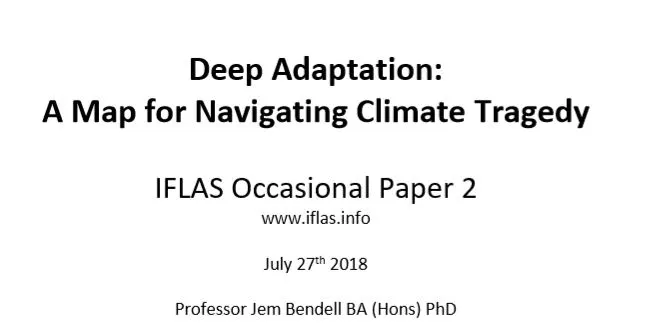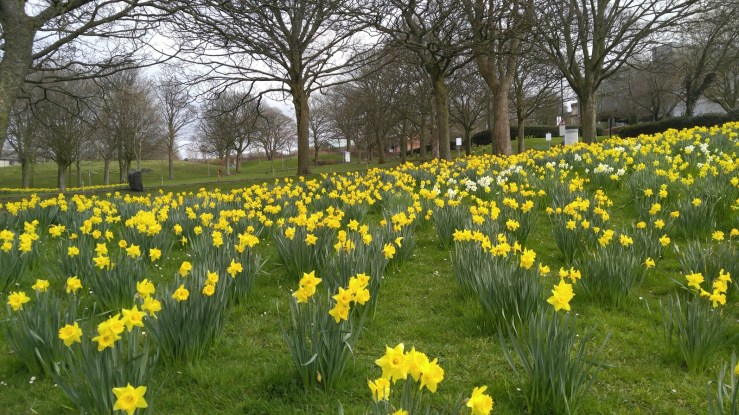A research paper concluding that climate-induced collapse is now inevitable, was recently rejected by anonymous reviewers of an academic journal.
It has been released directly by the Professor who wrote it, to promote discussion of the necessary deep adaptation to climate chaos.
“I am releasing this paper immediately, directly, because I can’t wait any longer in exploring how to learn the implications of the social collapse we now face,” explained the author Dr Bendell, a full Professor of Sustainability Leadership. 
In saying the paper was not suitable for publication, one of the comments from the reviewers questioned the emotional impact that the paper might have on readers. “I was left wondering about the social implications of presenting a scenario for the future as inevitable reality, and about the responsibility of research in communicating climate change scenarios and strategies for adaptation.” wrote one of the reviewers. “As the authors pointed out, denial is a common emotional response to situations that are perceived as threatening and inescapable, leading to a sense of helplessness, inadequacy, and hopelessness and ultimately disengagement from the issue…”
That perspective is discussed in the paper as one that enables denial. Professor Bendell explains in his response to the Editor, that the response may reflect “the self-defeating hierarchical attitude towards society that many of us have in both academia and sustainability, where we censure our own exploration of a topic due to what we consider should or should not be communicated. There is both scholarship and experience on the impact of communicating about disaster, and I discuss that in the paper.” Moreover, Bendell consulted with practicing psychotherapists on both the motivational and mental health implications of this analysis and was reassured that perceptions of a collective tragic future should not in itself be a cause for depression. Instead, it could trigger transformative reflection which could be supported – and would be inevitable one day, given the inevitability of mortality for all human life.
The paper offers a new framing for beginning to make sense of the disaster we face, called “deep adaptation.” It is one that Professor Bendell proposed in a keynote lecture two years ago and has influenced community dialogue on climate change in Britain in the past two years, including in Peterborough and Newcastle as well as being used by the Dark Mountain network.
The paper “Deep Adaptation: A Map for Navigating Climate Tragedy” is downloadable in pdf format, or as a podcast.
The response of Professor Bendell to the Editor of the journal follows below.
A list of resources to support people as they process this information, including emotional support is here.
A LinkedIn group on Deep Adaptation exists to support professional discussion of the topic.
Letter to the Editor of SAMPJ, Professor Carol Adams, from Professor Jem Bendell, 26th July 2018.
Dear Professor Adams,
It is an odd situation to be in as a writer, but I feel compassion for anyone reading my Deep Adaptation article on the inevitability of near term social collapse due to climate chaos! I am especially grateful for anyone taking the time to analyse it in depth and provide feedback. So, I am grateful to you arranging that and the reviewers for providing their feedback. Some of the feedback, particularly recommendations for a better introduction, were helpful. However, I am unable to work with their main requests for revisions, as they are, I believe, either impossible or inappropriate, as I will seek to explain.
I agree with Professor Rob Gray that “The journal’s constant exploration of new and challenging perspectives on how accountability and sustainability might play out in organisations ensures a stimulating source of articles, experiences and ideas.” It is why I was pleased to guest edit an issue last year and bring critical perspectives on leadership to its readership. However, the topic of inevitable collapse from climate change is so challenging it is not surprising it didn’t find support from the anonymous peer reviewers.
I would have had difficulty finding motivation for undertaking a complete re-write given the conclusion of the paper – that the premise of the “sustainable business” field that the journal is part of is no longer valid. Indeed, the assumptions about progress and stability that lead us to stay in academia in the field of management studies are also now under question.
The first referee questioned “to which literature (s) does this article actually contribute” and stated that “the research question or gap that you intend to address must be drawn from the literature,” continuing that “to join the conversation, you need to be aware of the current conversation in the field, which can be identified by reviewing relevant and recent articles published in these journals.” That is the standard guidance I use with my students and it was both amusing and annoying to read that feedback after having dozens of peer reviewed articles published over the last 20 years. The problem with that guidance is when the article is challenging the basis of the field and where there are not any other articles exploring or accepting the same premise. For instance, there are no articles in either SAMPJ or Organisation and Environment that explore implications for business practice or policy of a near term inevitable collapse due to environmental catastrophe (including those that mention or address climate adaptation). That isn’t surprising, because the data hasn’t been so conclusive on that until the last couple of years.
It is surprising therefore that the first reviewer says “the paper does not contain any new or significant information. The paper reiterates what has already been told by many studies.” The reviewer implies therefore that the paper is about climate change being a big problem. But the article doesn’t say that. It says that we face an unsolvable predicament and great tragedy. When the reviewer says “There are not clear contributions that can be derived from the article” then I wonder whether that is wilful blindness, as the article is saying that the basis of the field is now untenable.
At a couple of points, I attempted to cut through the unemotional way that research is presented. Or instance, when I directly address the reader about the implications of the analysis for their own likely hunger and safety, it is to elicit an emotional response. I say in the text why I express myself in that way and that although it is not typical in some journals the situation we face suggests to me that we do try to communicate emotively. The reviewer comments “the language used is not appropriate for a scholarly article.”
The second reviewer summarises the paper as “the introduction of deep adaptation as an effective response to climate change” which suggests to me a fundamental misunderstanding despite it being made clear throughout the paper. There is no “effective” response. The reviewer also writes “I am not sure that the extensive presentation of climate data supports the core argument of the paper in a meaningful way.” Yet the summary of science is the core of the paper as everything then flows from the conclusion of that analysis. Note that the science I summarise is about what is happening right now, rather than models or theories of complex adaptive systems which the reviewer would have preferred.
One piece of feedback from the 2nd reviewer is worth quoting verbatim:
“The authors stress repeatedly that “climate-induced societal collapse is now inevitable” as if that was a factual statement… I was left wondering about the social implications of presenting a scenario for the future as inevitable reality, and about the responsibility of research in communicating climate change scenarios and strategies for adaptation. As the authors pointed out, denial is a common emotional response to situations that are perceived as threatening and inescapable, leading to a sense of helplessness, inadequacy, and hopelessness and ultimately disengagement from the issue…”
This perspective is one I discuss in some detail in the paper, as one that enables denial. It reflects the self-defeating hierarchical attitude towards society that many of us have in both academia and sustainability, where we censure our own exploration of a topic due to what we consider should or should not be communicated. There is both scholarship and experience on the impact of communicating about disaster, and I discuss that in the paper.
The trauma from assessing our situation with climate change has led me to become aware of and drop some of my past preoccupations and tactics. I realise it is time to fully accept my truth as I see it, even if partially formed and not polished yet for wider articulation. I know that academia involves as much a process of wrapping up truth as unfolding it. We wrap truth in disciplines, discrete methodologies, away from the body, away from intuition, away from the collective, away from the everyday. So as that is my truth then I wish to act on it as well, and not keep this analysis hidden in the pursuit of academic respect. Instead, I want to share it now as a tool for shifting the quality of conversations that I need to have. Therefore, I have decided to publish it simply as an IFLAS Occasional Paper.
The process has helped me realise that I need to relinquish activities that I no longer have passion for, in what I am experiencing as a dramatically new context. Therefore, I must step back from the Editorial team of the journal. Thank you for having involved me and congratulations on it now being in the top ten journals in business, management and accounting.
Please pass on my thanks to the reviewers. On my website http://www.jembendell.com I will be listing some links to articles, podcasts, videos and social networks that are helping people explore and come to terms with a realisation of near term collapse (and even extinction), which they may be interested in.
Yours sincerely,
Jem Bendell
Donate to keep Jem writing / Read Jem’s book Breaking Together / Read Jem’s key ideas on collapse readiness / Subscribe to this blog / Read the Scholars’ Warning / Visit the Deep Adaptation Forum / Receive Jem’s Biannual Bulletin / Receive the Deep Adaptation Review / Watch some of Jem’s talks / Find Emotional Support.
Continue reading “The study on collapse they thought you should not read – yet”



You must be logged in to post a comment.